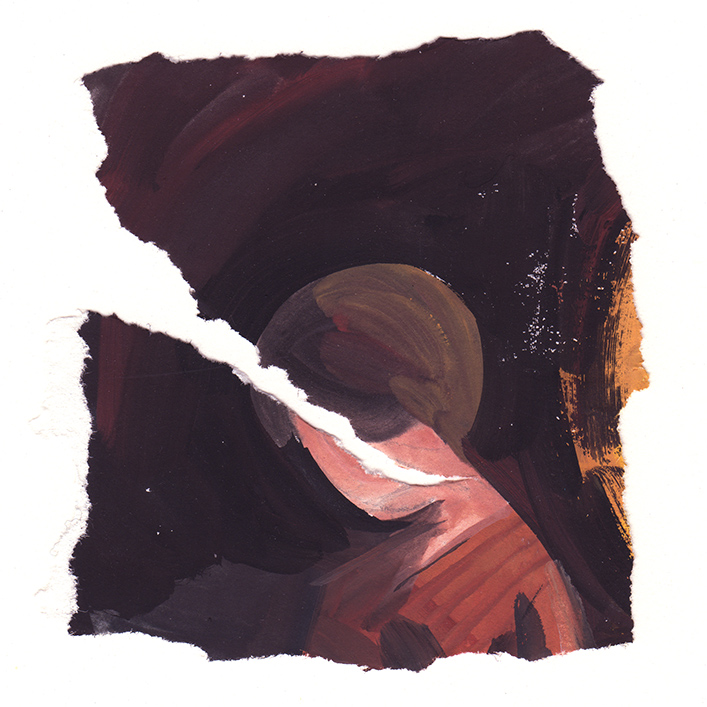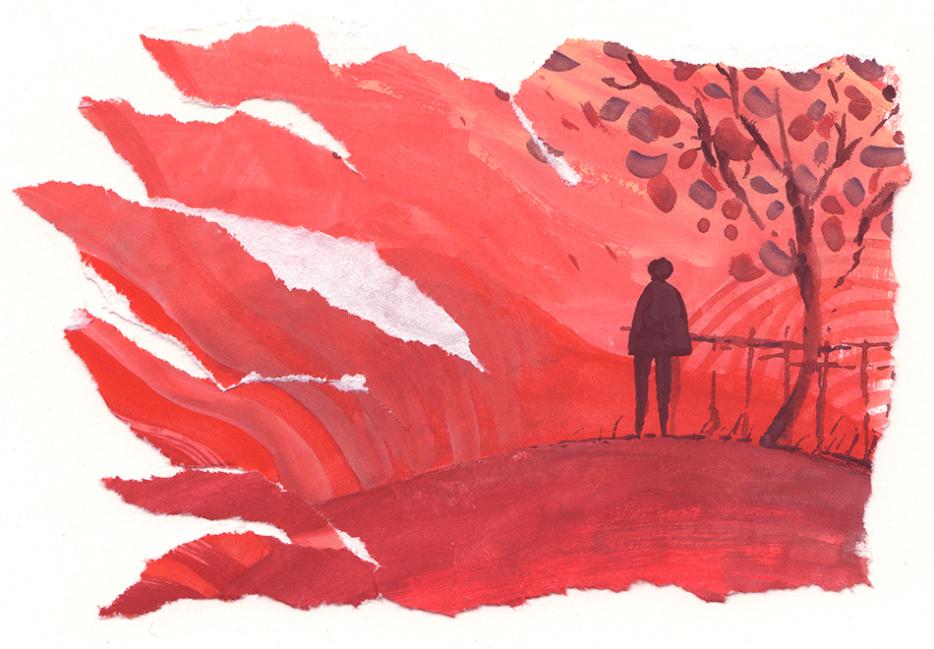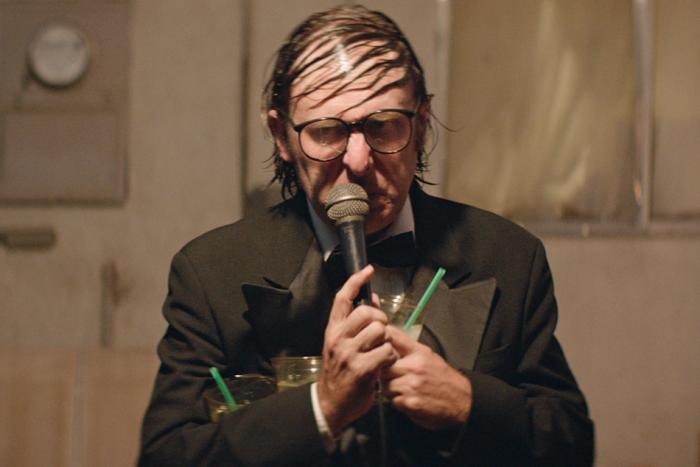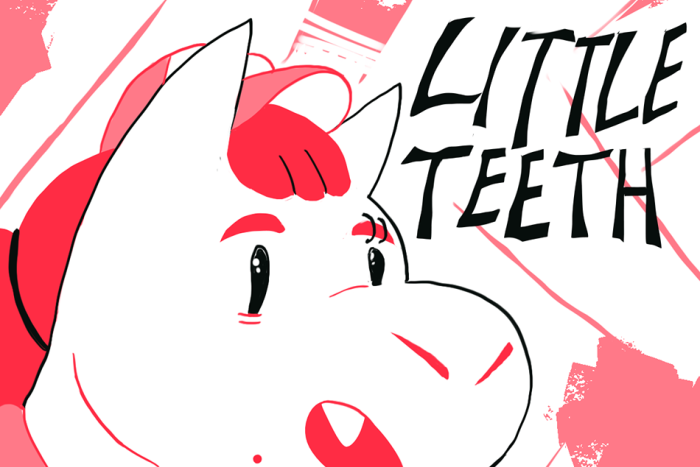Grozny, 2003
The oilmen have arrived from Beijing for a ceremonial signing over of drilling rights. “It’s a holiday for them,” their translator told me, last night, at the Grozny Eternity Hotel, which is both the only five-star hotel and the only hotel in the republic. I nodded solemnly; he needn’t explain. I came of age in the reign of Brezhnev, when young men would enter civil service academies hardy and robust, only to leave two years later anemic and stooped, cured forever of the inclination to be civil or of service to anyone. Still, Beijing must be grim if they’re vacationing in Chechnya.
“We’ll reach Grozny in ten minutes,” I announce to them in English. The translator sits in the passenger seat. He’s a stalk-thin man with a head of hair so black and lustrous it looks sculpted from shoe polish. I feel a shared camaraderie with translators—as I do with deputies and underlings of all stripes—and as he speaks in slow, measured Mandarin, I hear the resigned and familiar tone of a man who knows he is more intelligent than his superiors.
The road winds over what was once a roof. A verdigris-encrusted arm rises from the debris, its forefinger raised skyward. The Lenin statue once stood in the square outside this school, arm raised, rallying the schoolchildren to glorious revolution, but now, buried to his chin like a cowboy sentenced to death beneath the desert sun, Vladimir Ilich waves only for help. We drive onward, passing brass bandoliers and olive flak jackets, red bandannas and golden epaulettes, the whole palette of Russian invasion painted across a thunderstorm of wreckage. Upon seeing the zero-two Interior Ministry plate dangling below the Mercedes’s hood, the spies, soldiers, policemen, and armed thugs wave us through without hesitation. The streets become more navigable. Cement trucks can’t make it from the cement works to the holes in the ground without being hijacked by one or another shade of our technicolor occupation and sold to Russian construction companies north of the border, so road crews salvage office doors from collapsed administration buildings and lay them across the craters. Attached to the doors are the names and titles of those who had once worked behind them. Mansur Khalidov: Head of Oncology; City Hospital Number Six. Yakha Sagaipova: Assistant Director of Production; Ministry of Oil and Gas Industry. Perhaps my name is written over a crater on some shabby side street, supporting the weight of a stranger who glances at the placard Ruslan Dokurov: Deputy Director; Grozny Museum of Regional Art and wonders if such a person is still alive.
“A large mass grave was recently discovered outside of Grozny, no?” the translator asks.
“Yes, an exciting discovery. It will be a major tourist attraction for archaeology enthusiasts.”
The translator frowns. “Isn’t it a crime scene?”
“Don’t be ridiculous. It’s millions of years old.”
“But weren’t the bodies found shot execution-style?” he insists.
I shrug him off. Who am I to answer for the barbarities of prehistoric man?
The translator nods to a small mountain range of rubble bulldozed just over the city limits. “What’s that?”
“Suburbs,” I say.
We pass backhoes, dump trucks, and jackhammers through the metallic dissonance of reconstruction that comes as a welcome song after months of screaming shells. The cranes are the tallest man-made structures I have ever seen in person. I drive to the central square, once the hub of municipal government, now a brown field debossed with earthmover tracks. Nadya once lived just down the road. The oilmen climb out and frown at each other, then at the translator, and then finally at me.
Turning to the northeast, I point at a strip of blue sky wedged between two fat cumuli. “That was Hotel Kavkaz. ABBA stayed two nights. I carried their guitars when I worked there one summer. Next to that, picture an apartment block. Before ninety-one only party members lived there and after ninety-one only criminals. No one moved in or out.”
None of the oilmen smile. The translator leans to me and whispers, “You are aware, of course, that these three gentlemen are esteemed members of the Communist Party of China.”
“It’s okay, I’m a limo driver.”
The translator stares blankly.
“Lloyd from Dumb and Dumber? ”
Nothing.
“Jim Carrey. A brilliant actor who embodies the senselessness of our era,” I explain.
The interpreter doesn’t bother translating. I continue to draw a map of the square by narration, but the oilmen can’t see what I see. They see only an empty square demolished by bomb and bulldozer.
“Come, comrades, use your imagination,” I urge, but they return to the Mercedes, and I am talking only to the translator, and then he returns to the Mercedes, and I am talking only to myself.
*
Three months earlier, the Interior minister told me his idea. The proposition was ludicrous but I listened with the blank- faced complacency I had perfected throughout my twenty- three years as a public servant.
“The United Nations has named Grozny the most devastated city on earth,” the minister explained between bites of moist trout.
I wasn’t sure of the proper response, so I gave him my lukewarm congratulations.
“Yes, well, always nice to receive recognition, I suppose. But as you might imagine, we have an image problem.”
He loomed over his desk in a high-backed executive chair, while across from him I listened from an odd, leggy stool designed to make its occupant struggle to stay upright before the minister. The minister’s path had first crossed mine fifteen years earlier, when he had sought my advice regarding a recently painted portrait of him and his sons, and I had sought his regarding a dacha near my home village. He’d had two sons then. The first emigrated before the most recent war to attend an American pharmacology school, now worked at a very important drugstore in Muskegon, Michigan. I don’t know what happened to the second, but the lack of ministerial boasting serves as a death knell. The portrait, which still hung on the far wall, depicted the minister and his sons in tall leather boots, baggy trousers, long woolen chokhas,and sheepskin papakhas heroically bestriding the carcass of a slain brown bear that bore a striking resemblance to Yeltsin.
“Foreign investment,” the minister continued. “Most others don’t agree with me, but I believe we need to attract capital unconnected to the Kremlin if we’re to achieve a degree of economic autonomy, and holding the record for the world’s largest ruin isn’t helping. Rosneft wants to sink its fangs into our oil reserves, but the Chinese will cut a better deal. Have you heard of Oleg Voronov? He’s on the Rosneft board, the fourteenth richest man in Russia, and one of the hawks who pushed for the 1994 invasion. The acquisition of Chechen oil is among his top priorities.”
The minister set down his silverware and began sorting through the little trout bones on his plate, reconstructing the skeleton of the fish he had consumed. “If we’re to entice foreign investment, we need to rebrand Chechnya as the Dubai of the Caucasus. That’s where you come in. You’re what, the director of the Museum of Regional Art?”
“Deputy director, sir.”
“That’s right, deputy director. You did fine work sending those paintings to Moscow. A real PR coup. Even British newspapers wrote about the Tretyakov exhibit.”
With a small nod, I accepted the compliment for what was the lowest point of my rut-ridden career. In 1999, Russian rockets had demolished the museum and with my staff I’d saved what I could from the ensuing fires. Soon after, I was ordered to surrender them to the Russians. When I saw that I’d been listed as co-curator of an exhibit of the rescued Chechen paintings at Moscow’s Tretyakov Gallery, I closed my lids and wondered what had happened to all the things my eyes have loved.
The minister tilted the plate over the rubbish bin and the ribs slid from the spine of the skeleton fish. “Nothing suggests stability and peace like a thriving tourism sector,” the minister said. “I think you’d be the perfect candidate to head the project.”
“With respect, sir,” I said. “I did my dissertation on nineteenth-century pastoral landscapes. I’m a scholar. This is all a bit beyond me.”
“I’ll be honest, Ruslan, for this position we need someone with three qualifications. First, he must speak English. Second, he must know enough about the culture and history of the region to show that Chechnya is much more than a recovering war zone, that we possess a rich cultural history unsullied by violence. Third, and most important, he must be that rare government man without links to human rights abuses on either side of the conflict. Do you meet these qualifications?”
“I do, sir,” I said. “But still, I’m entirely unqualified to lead a tourism initiative.”
The minister frowned. He scanned the desk for a napkin before reaching over to wipe his oily fingers on my necktie. “According to your dossier, you’ve worked in hotels.”
“When I was sixteen, I was a bellhop.”
“Well,” the minister beamed. “Then you clearly have experience in the hospitality industry.”
“In the suitcase-carrying industry.”
“Then you accept?”
I said nothing, and as is often the case with men who possess more power than wisdom, he took my silence for affirmation. “Congratulations, Ruslan. You’re head of the Grozny Tourist Bureau.” And so my future was decided, as it often is, entirely without my consent.
Office space was a valuable commodity given how few buildings were still standing, so I worked from my flat. I spent the first morning writing Tourist Bureau on a piece of cardboard. My penmanship had been honed by years of attempting to appear productive at the office. I taped the sign to the front door, but within five minutes it had disappeared. I made a new sign, then another, but the street children who lived on the landing kept stealing them. After the fifth sign, I went to the kitchen and drank the vodka bottle the minister had sent over in celebration until I passed out in tears on the floor. So ended my first day as Tourist Bureau chief.
Over the following weeks, I designed a brochure. The central question was how to trick tourists into coming to Grozny voluntarily. For inspiration, I studied pamphlets from the tourist bureaus of other urban hellscapes: Baghdad, Pyongyang, Houston. From them I learned to be lavishly adjectival, to treat prospective tourists as semiliterate gluttons, and to impute reports of kidnapping, slavery, and terrorism to the slander of foreign provocateurs. Thrilled by my discoveries, I tucked a notebook into my shirt pocket and raced into the street. Upon seeing the empty space where an apartment block once stood, I wrote wide and unobstructed skies! I watched jubilantly as a pack of feral dogs chased a man, and wroteunexpected encounters with natural wildlife! The city bazaar hummed with the sales of looted industrial equipment, humanitarian aid rations, and munitions suited for every occasion: unparalleled shopping opportunities at the Grozny bazaar! Even before I reached the first checkpoint, I had scribbled first-rate security! The copy wrote itself; the real challenge was finding images that substantiated it. After all, the siege had remapped the city. Debris rerouted roads through abandoned warehouses—once I found a traffic jam on a factory floor—and what was not rerouted was razed. A photograph of the present city would send a cannonball through my verbiage-fortified illusion of a romantic paradise for heterosexual couples. But I couldn’t find suitable photo- graphs of prewar Grozny within the destroyed archives. In the end, I forwent photographs altogether and instead used January, April, and August of the 1984 Grozny Museum of Regional Art calendar for visuals. In the three nineteenth-century landscapes, swallows frolic over ripening grapevines and a shepherd minds his flock beneath a sunset; they portray a land untouched by war or communism and beside them my descriptions of a picturesque Chechnya do not seem entirely inappropriate.

The newly installed phone rings one morning and the gloomy Interior minister greets me. “We’re properly fucked.”
“Nice to hear from you, sir,” I reply. I’m still in my sleeping clothes and even for a phone conversation I feel unsuitably dressed.
“The Chinese are out. They traded their drilling right to Rosneft for a few dozen Russian fighter jets.”
I nod. It explains why China hadn’t sent their most shrewd or sober representatives. “So this means Rosneft will drill?”
“Yes, and it gets even worse,” he heaves. “I may well be demoted to deputy minister.”
“I was a deputy for many years. It’s not as bad as you think.”
“When the world takes a dump, it lands on a deputy’s forehead.”
I couldn’t deny that. “What does this mean for the Tourist Bureau?”
“You’ll have one more tour, then it’s safe to say you’ll need to find new employment. Oleg Voronov. From Rosneft.”
It took a beat for the name to register. “The fourteenth richest man in Russia?”
“Thirteenth now.”
“With respect, sir, I give tours to human rights activists and print journalists, people of no power or importance. I’m not qualified to give a tour to a man of his stature. Why does he even want a tour?”
“My question precisely! Apparently his wife, Galina Something-or-other-ova, the actress, has heard of this art museum you’ve cobbled together. What’ve you been up to?”
“It’s a long story, sir.”
“You know I hate stories.”
“Yes, sir.”
“Well, do show him our famed Chechen hospitality. Be sure to offer him a glass of unboiled tap water. Let’s give the thirteenth richest man in Russia an intestinal parasite!”
“Don’t worry, sir. I’m a limo driver.”
“I’ll land on my feet, Ruslan. Don’t lose too much sleep over my future. Perhaps I’ll visit America. I’d like to see Muskegon while I’m still young and healthy enough to really experience it.”
Three weeks pass and here he is, Oleg Voronov sitting in the backseat of the Mercedes with his wife, the actress Galina Ivanova. Up front is his assistant, a bleached-blond parcel of productivity who takes notes even when no one is speaking. But try as I might, I’m unable to properly hate Voronov. So far he’s been untalkative, inattentive, and uncurious; in short, a perfect tourist. Galina, on the other hand, has read Khassan Geshilov’s The Origins of Chechen Civilization and recites historical trivia unfamiliar to me. The office doors of dead administrators clatter beneath us and she asks thoughtful questions, treating me not as a servant, or even a tour guide, but as a scholar. I casually mention the land mines, the street children, the rape and torture and indiscriminate suffering, but Voronov and his wife shake their heads with sympathy. Nothing I say will turn them into the masks of evil I want them to be.
The tour concludes at my flat. I’m hesitant to allow a man of his stature into the small world of my museum, but his wife insists. As we ascend the stairwell, Voronov checks his watch, a cheap plastic piece of crap, and in that moment I know I will not hate him as he deserves to be hated.
“This is what remains of the Grozny Museum of Regional Art,” I say as I open the door. Voronov and his assistant circle the room. I glance to the kitchen sink, but a glass of unboiled tap water is a fate I wouldn’t wish upon even a Russian oligarch.
Voronov and Galina pass the burned-out frames to the pasture painting. “Is this the one?” he asks her. She nods.
“A Zakharov, no?” he asks, fingering his lapel as he turns to me. “There was an exhibit of his at the Tretyakov, if memory serves.”
Only now do I see clearly the animals I have invited into my home. “The fires destroyed most of the original collection when the museum was bombed. We sent what was saved to the Tretyakov.”
“But not this?”
“Not this.”
“Rather reckless, don’t you think, to leave such a treasure on an apartment wall guarded only by street urchins?”
“It’s a minor work.”
“Believe it or not, my wife has been looking for this painting. It has special meaning for her. I know, I know. I married a sentimentalist.”
“Could I offer you a glass of water?”
“You could offer me the painting.”
I force a laugh. He laughs too. We are laughing. Ha-ha! Ha-ha! It’s all a joke. “The painting is not for sale,” I say.
He stops laughing. “It is if I want to buy it.”
“This is a museum. You can’t have a painting just because you want it. The director of the Tretyakov wouldn’t sell you art from his walls just because you can afford it.”
“You are only a deputy director and this isn’t the Tretyakov.” There’s real pity in his voice as he surveys the ash flaking from the canvases, the dirty dishes stacked in the sink, and yes, now, at last, I hate him.
“Come now, I have a penthouse gallery in Moscow. Temperature and moisture controlled. First-rate security. No one but Galina, and a few guests, and I will ever see it. You must realize I’m being more than reasonable.” In a less than subtle threat he nods out the window to the street where his three armed Goliaths skulk beside their Land Rover. “What is the painting worth?”
“It’s worth,” I begin, but how can I finish? What price can I assign to the last Zakharov in Chechnya, to the last image of my home? One sum comes to mind, but it terrifies me. Wouldn’t that be the worst of all outcomes, to lose both the Zakharov and Nadya in the same transaction? “Just take it,” I say. “You took everything else. Take this too.”
Voronov bristles. “I’m not a thief. Tell me what it’s worth.”
My gaze floats and lands upon the bumper sticker of WWJCD? inscribed within the body of a fish. What would he do? Jim Carrey would be brave. In the end, no matter how hard, Jim Carrey does the right thing. I close my eyes. I don’t want to say it. “One hundred and fifteen thousand dollars. U.S.”
“One-fifteen? ”
I nod.
“That’s what, three-point-seven, three-point-eight million rubles? Let’s make it an even four,” Voronov says with a single fleshy clap. His wife still hasn’t looked away from the painting. He turns to his assistant who has followed him around the room, taking notes all the while. The assistant unyokes herself from a mammoth purse, pulls out eight stacks of banded five-thousand-ruble bills, and lays them on the floor. “Never trust banks,” Voronov says. “You can have that advice for free. It’s been a pleasure.” He slaps my back, tells the assistant to bring the canvas down with her, and heads for the door.
Then he’s gone. Galina remains at the Zakharov. Even now as I’m losing it, I’m proud my painting can elicit such sustained attention.
She nods to the stick-figure silhouettes of my wife and child, smiling as she dabs the corners of her eyes. “You wouldn’t understand, but someone I once loved died in this field.”
She pats my shoulder and walks to the door.
Then she’s gone and I’m left alone with the assistant whose saccharine perfume smells of vaporized cherubs. I close my eyes and try to imagine the darkness extending into permanent night, to imagine our lives as dreams we tumble through, but I can’t imagine, because even at night I know morning will come, and even with my eyes clamped I know I will open them. What will Nadya see when she opens hers? Who will she see when she sees me?
“And you’ll have to give us a curatorial description,” the assistant says. “Something we can mount on a placard.”
She passes me the notepad and I stand before my painting for a long while before I begin. Notice how the shadows in the meadow mirror the clouds in the sky, I write. Or the way the leaves of the apricot tree blow in the same direction as the grass on the far side of the meadow. For such a master, no verisimilitude is excluded. Notice the wall of white stones cutting an angle across the composition. It both gives depth and offsets the horizon line. On the left side of the canvas, running up the hill, you will see channels of turned soil. One could assume they are freshly dug graves, or recently buried land mines, but look closer and see they are the furrows of a newly planted herb garden. The first shoots of rosemary already peek out. In this painting, Zakharov portrays all the peace and tranquility of a spring day. The sun shines comfortably and hours remain before nightfall. Toward the crest of the hill, nearing the horizon, you may notice what look to be the ascending figures of a woman and a boy. Pay them no mind, for they are merely the failures of a novice restoration artist. They are no more than his shadows. They are not there.
This story appears in The Tsar of Love and Techno by Anthony Marra, available now. All illustrations by Roman Muradov.





